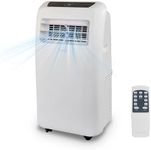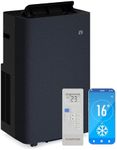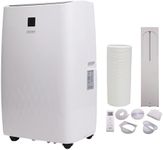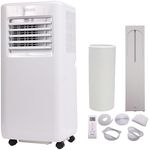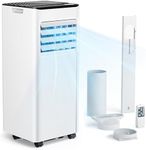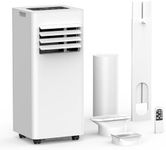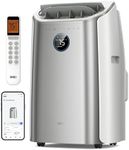Buying Guide for the Best Portable Air Conditioner
Choosing the right portable air conditioner involves understanding your cooling needs, the space you want to cool, and the features that will make your experience more comfortable and efficient. Portable air conditioners are a great solution for cooling specific areas without the need for permanent installation. They are versatile and can be moved from room to room, making them ideal for renters or those who need temporary cooling solutions. To make the best choice, consider the size of the area you need to cool, the energy efficiency of the unit, and any additional features that might enhance your comfort.Cooling Capacity (BTU)BTU, or British Thermal Units, measures the cooling capacity of an air conditioner. It's important because it determines how effectively the unit can cool a given space. Generally, the higher the BTU, the larger the area it can cool. For small rooms up to 300 square feet, a unit with 8,000-10,000 BTU is sufficient. Medium-sized rooms up to 500 square feet may require 10,000-14,000 BTU, while larger spaces might need 14,000 BTU or more. To pick the right one, match the BTU rating to the size of the room you want to cool. Consider factors like ceiling height, sunlight exposure, and room insulation, as they can affect cooling efficiency.
Energy Efficiency Ratio (EER)The Energy Efficiency Ratio (EER) indicates how efficiently a portable air conditioner uses energy to cool a room. A higher EER means better energy efficiency, which can lead to lower electricity bills. EER is calculated by dividing the BTU rating by the power consumption in watts. Units with an EER of 10 or higher are considered energy-efficient. When choosing, consider how often you'll use the air conditioner and the potential savings on energy costs. If you plan to use it frequently, investing in a unit with a higher EER can be beneficial in the long run.
Noise LevelNoise level is measured in decibels (dB) and indicates how loud the air conditioner will be when operating. This is important for maintaining a comfortable environment, especially in bedrooms or offices where quiet is preferred. Portable air conditioners typically range from 50 to 70 dB. For a quieter experience, look for units that operate at 50-55 dB. If noise is not a major concern, you might be comfortable with a unit that operates at a higher decibel level. Consider where you will place the unit and how noise might affect your daily activities.
Size and PortabilityThe size and portability of a unit determine how easily it can be moved and where it can be placed. This is important for convenience and space management. Portable air conditioners vary in size and weight, with some models being more compact and easier to move than others. If you plan to move the unit frequently between rooms, look for a lighter model with wheels and handles. If it will remain in one place, size may be less of a concern, but ensure it fits comfortably in the intended space without obstructing movement or access.
Ventilation and ExhaustPortable air conditioners require proper ventilation to expel hot air, usually through a window or sliding door. This is crucial for efficient operation and to prevent the unit from overheating. Most units come with a window kit for easy installation. Consider the type of windows or doors in your space and ensure the unit's exhaust system is compatible. If you have non-standard windows, you may need to get creative with installation. Ensure the exhaust hose is long enough to reach the window without stretching, as this can affect performance.
Additional FeaturesAdditional features can enhance the functionality and convenience of a portable air conditioner. These may include programmable timers, remote controls, sleep modes, and dehumidifiers. Programmable timers allow you to set the unit to turn on or off at specific times, which can save energy. Remote controls offer convenience, allowing you to adjust settings from a distance. Sleep modes adjust the temperature gradually for comfort during the night. Dehumidifiers can be beneficial in humid climates, as they remove excess moisture from the air. Consider which features align with your lifestyle and comfort needs.



